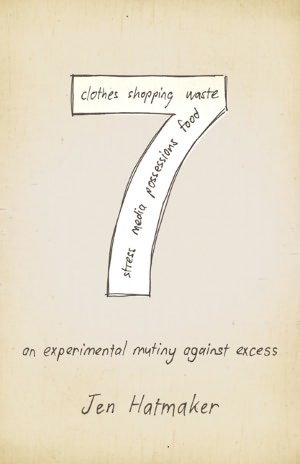
I haven't had a chance to read this book, but she says it just "hit her" with the way this author put things. You know someone can say something to you a million times and then one day someone else says it in a different way and you just "get it." Just like in the Gospels, those men all saw the same thing, but all through different eyes. Leslie gave me this recap of the book, and I think it is a huge challenge.
The Hatmaker
family pastored a mega-church with all of the big fancy bells and whistles that
comes with a mega church. They were
surrounded by very wealthy people. As
she says in the book, they were the “blessed blessing the blessed”. They realized they were not being good
stewards and began to downsize and change their lifestyle. Then, they took in a family that was
evacuated during Hurricane Ike. They
thought they were living a pretty modest lifestyle at this point, but the first
thing a ten-year-old evacuee said when he walked into their home was “Dad! This white dude is rich!” It made them realize that while they thought
they had changed so much and were living so modestly, they were still very well
off compared to so much of the world and really were not sacrificing much at
all.
This is
where the idea of “7” comes into play.
Here were Jen’s thoughts:
“What in my
life, in the lives of most westerners, is just too stinking much?
-Food
-Clothes
-Possessions
-Media
-Waste
-Spending
-Stress
Seven
months, seven areas, reduced to seven simple choices.”
The first
month, Jen chose seven food items (chicken, eggs, whole-wheat bread, sweet
potatoes, spinach, avocados, and apples) and only water to drink.
The second
month, Jen chose seven items of clothing to wear for the entire month. Her choices included one pair of dark wash
jeans, one long-sleeved solid black fitted t-shirt, one short-sleeved black
t-shirt, one short-sleeved gray t-shirt, one pair of gray drawstring knit Capri
pants, one long silk brown dress shirt, one pair of cowboy boots, and one pair
of tennis shoes. While she didn’t feel
like clothes were a big deal to her, when she counted the items in her closet
(327), she realized that she was definitely living in excess. Even if every item only cost $20 on average
(which is unlikely), it would mean she had $6,540 worth of clothes in her
closet. If the clothing items averaged
$30 each (more realistic), it would mean she had $9,810 worth of clothes in her
closet. At the end of the month, she
says “wearing seven clothes was easier than I expected.” Turns out, it made life more simple not
having to worry about picking out a cute outfit with matching accessories every
day.
Month three
was all about possessions. The plan is
to give seven items that they own away…every day for the entire month. She talks about their 2465 square foot house
being packed full of “stuff”. “Why do we
have so much junk? How am I supposed to
keep up with all this? Where did this
all come from? And then I remember: I bought it all. I supposed acting like someone snuck into my
house while I was feeding the homeless and filled my shelves with more black
shirts and a fourth set of Legos against my will is probably ignoble. To hear me fuss, you’d think I was a victim
of drive-by consumerism. Guess what,
doves? I’m a part of this little
game. I see it (on you, on them, in
their house, at Target, on TV). I
manufacture a need for it. Then I buy
it. I use it a little or not. I store it/shelve it/stack it/ stuff it/ get
tired of it, then wage war against it one day when all my little things are
strewn about as escapees from their shelves and drawers. I could blame Big Marketing for selling me
imagined needs. I could point a finger
at culture for peer pressuring me into having nicer things. I might implicate modern parenting, which
encourages endless purchases for the kids, ensuring they aren’t the “have-nots”
in a sea of “haves”. I could just
dismiss it all with a shrug and casual wave of the hand. Oh, you know me! Retail therapy! But if I’m being truthful, this is a
sickening cycle of consumerism that I perpetuate constantly.”
In month
four, Jen gave up TV, gaming, facebook/twitter, iPhone apps, radio, texting,
and internet. Texting was allowed if it
was a time saver, not a time waster.
Internet was also allowed if it was for jobs, kid’s school, adoption
process (they were adopting during the time she wrote the book). Here’s her summary on the month:
“Whew! What
a month! I know in the big scheme of
things, a media fast is not headlining news, but I gotta tell you, we had to
dig deep this last week. For me, it
wasn’t so much the media I was missing but the knowledge that I was the only
one missing it. The party was going on
outside my window, and I uninvited myself.
But the wiser (read:smaller) part of my brain interrupted this pity
party with a question: What are you really missing? Asinine television programming? Web sites that suck you in then waste your
time? The Facebook knowledge that
someone is going to the store: or her “son went big boy poopy in the big boy
potty today”? These don’t enrich my life
in the slightest. They do, however,
steal energy from my home and family substituting face-to-face time with
screens. We’re all losing on this
exchange, and we won’t revert to the plugged-in family we were before.”
In month
five, Jen began gardening, composting, conserving energy and water, recycling
(everything), driving only one car, shopping thrift/second-hand stores, buying
only local. I won’t go into too much
detail about this chapter since it is a little off the simplicity topic, but
she does say that the point is to “stop careless consumption that requires
nothing of me.”
During month
six, Jen chooses only 7 stores/vendors to shop at/pay for the month including
Sunset Valley Farmer’s Market, HEB gas station, online bill pay, kid’s school,
limited travel fund, emergency medical, and Target (if absolutely
necessary). Here are some interesting
statistics on spending:
Annual U.S. spending on cosmetics: $8
billion
Basic education for all global
children: $6 billion
Annual U.S. and European spending on
perfume: $12 billion
Clean water for all global citizens:
$9 billion
Annual U.S. and European spending on
pet food: $17 billion
Reproductive health for all women:
$12 billion
Here’s her month six wrap up:
“This. Month. Was. Hard. But good.
It’s one of those. A good hard. Vast consumption is so ordinary that its
absence was shocking. I didn’t realize
how casually I ‘grab lunch,’ or ‘run through the bookstore,’ or ‘pick up that
little scarf.’ I admit: I have a compulsion to buy something somewhere. My craving is nonspecific; it just involves
being in a store or restaurant and handing my debit card over and getting
something back.”
Month seven was about stress. She says, “We have too much going on. We are short fused, stressed out, overextended,
and unrested. This pace is not
sustainable. I don’t want it to be. This season of life is passing me by,
accelerated by a lack of boundaries.
Most days I just try to keep the wheels on, not living in the moment at
all; I’m just getting it all done while thinking about what’s left. My kids and husband get half answers. Every day I
could take a two-hour nap, so exhausted do I feel at 1:00 pm. I have considered ending my life over the
volume of e-mails. Such is the
ridiculous American life. Every one of
my friends has a similar story. None of
us are happy about it, yet we keep filling the calendars. Yes, I’m in; we’ll sign up; I’ll do it. We race from one activity to another,
teaching our children to max out and stress out. Nice legacy.
During month seven, they pause and
pray seven times a day (midnight, dawn, mid morning, noon, mid afternoon, early
evening, and bedtime). They also observe
the Sabbath from sundown on Saturday to sundown on Sunday. Just a side not- the Sabbath actually begins
on Friday evening, but in American culture the Sabbath is on Sunday. Month seven falls in November so they spend
time at the family’s farm so that’s why she talks about “taking a sabbatical”
and “living in a barn”.
Here’s what she has to say at the end
of month seven:
“But these pauses, plus the Sabbath,
plus the sabbatical taught me something.
My heart craves a slower life. I
want people to stop prefacing their phone calls with this: ‘I know you’re so
busy, but if I could just have a second…’
I want to figure out what this means for our family. We can’t live in the barn forever, nor can we
pull out of work, ministry, school, community, mission, family, and all the
activities that accompany them. But what
can we do to cultivate a quiet ranch heart in a noisy urban world?”
I liked this quote from the book to
sum things up:
“Jesus, may
there be less of me and my junk and more of You and Your kingdom.”
Note: I have not read this book and am not saying that this book has the answers. The only book that has the answers is the Bible.
Note: I have not read this book and am not saying that this book has the answers. The only book that has the answers is the Bible.









1 comment :
Kalina~ I love this! You are inspiring me, deeply! Thank-you for sharing your thoughts. I do hope you have a part 3. And I would love to read this book. Our excess is staggering. I am prying my hands open one finger at a time and letting "stuff" go.
XO
Post a Comment